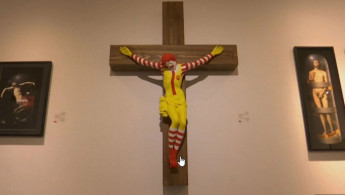Israeli museum removes 'McJesus' artwork after Palestinian-Christian protests
An art exhibit depicting a fast-food clown nailed to a cross is to be taken off display at an Israeli art museum following protests and demands for its removal by Palestinian Christians.
The mayor of the northern port city of Haifa, where the artwork has been on display at the Museum of Art since August, wrote on Facebook Wednesday that the controversial exhibit would be removed "as soon as possible".
Contacted by AFP, a municipal spokesman declined to say if it was still on display Thursday.
"Beyond what the mayor wrote, we have nothing to say," he said.
The work, entitled "McJesus", is a statue of a crucified Ronald McDonald by Finnish artist Jani Leinonen.
It is part of "Sacred Goods", an exhibition about religion and faith in the culture of consumerism.
A copy of the loan agreement posted on mayor Einat Kalish-Rotem's official Facebook page shows that the work was in any case to be returned to Finland by the end of this month.
Despite being on show since the summer, images of the exhibits only began circulating on social media last week, prompting a demonstration outside the museum on Friday in which stone-throwing protestors injured three police officers with stones.
Two Molotov cocktails have also hit the museum, police said.
Twitter Post
|
Palestinian Christian leaders petitioned the Haifa district court to order the museum and municipality to remove "McJesus".
Israeli Culture Minister Miri Regev also called for it to be removed.
'Affront to our symbols'
Kalish-Rotem's Facebook statement sought to separate the works' imminent departure from the protests.
"In agreement with church leaders, and as the loan agreement for the 'McJesus' statue is about to expire, the work will be removed and returned as soon as possible," she wrote.
"The remaining items will be hung in a closed room."
"Without any connection, we believe in freedom of speech as part of the cornerstones of democracy," she added.
"We regret the distress experienced by the Christian community in Haifa, and the physical injury and violence that followed."
Wadie Abunassar, adviser to church leaders in the Holy Land, said the show was not culturally appropriate for Israel, where religious feelings run deep.
"To us, as Arabs and Christians, this is an affront to our symbols, and we demand their removal," he said earlier this week.
There are an estimated 1.6 million Palestinian citizens of Israel, comprising roughly 20 percent of Israel’s population.
More than 140,000 are Christians, the majority members of the Greek Orthodox church.
"In Israel such displays against Muslims and Jews would be taboo, but against Christians they're allowed," Abunassar said.
Another person demanding the removal of "McJesus" was the artist who created it.
The attention the Christian campaign drew to the exhibition surprised Leinonen, who said he had in September demanded the museum remove it "as a protest against Israel's human rights violations" against Palestinians.
Following last week's protests, Leinonen contacted the curator again to have "McJesus" removed, he said.





 Follow the Middle East's top stories in English at The New Arab on Google News
Follow the Middle East's top stories in English at The New Arab on Google News


